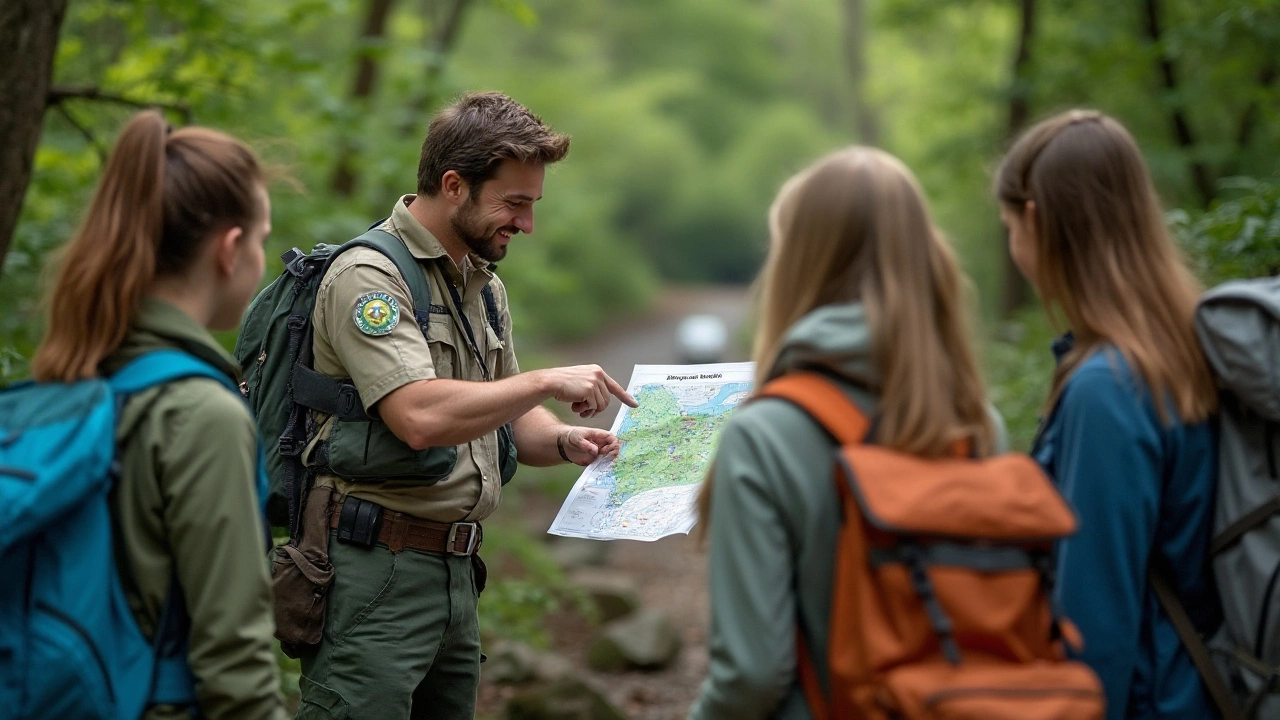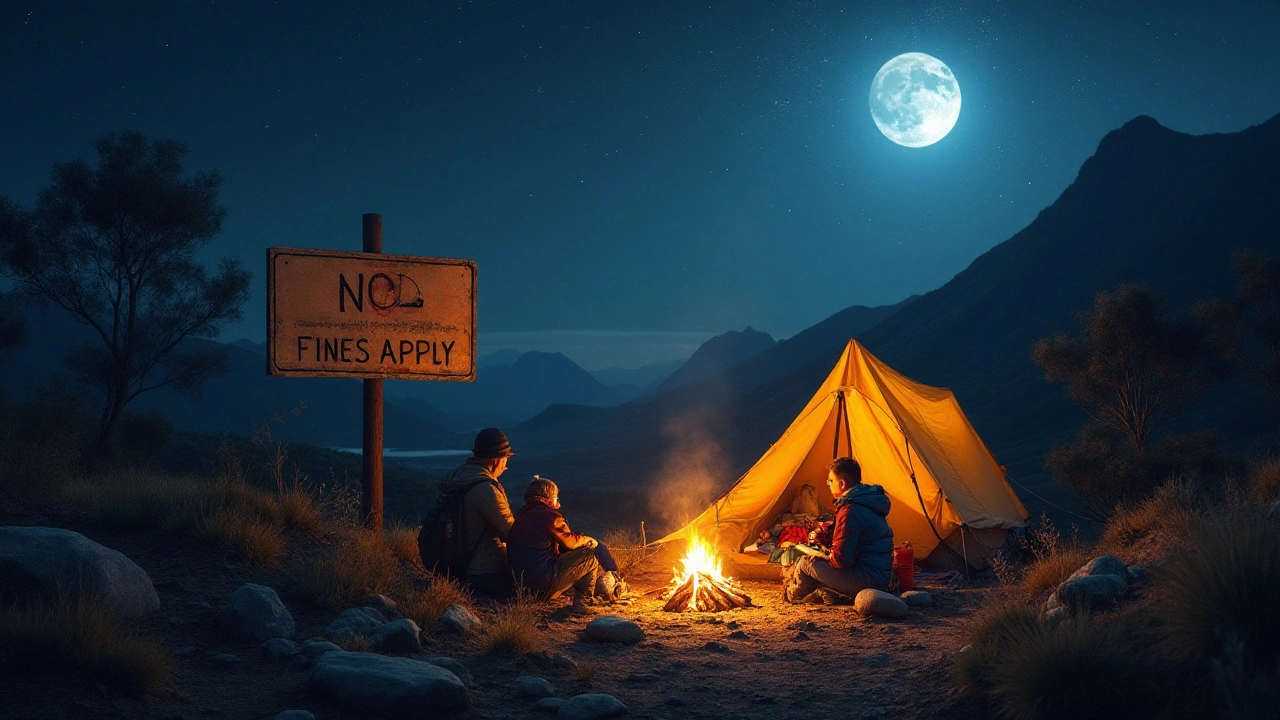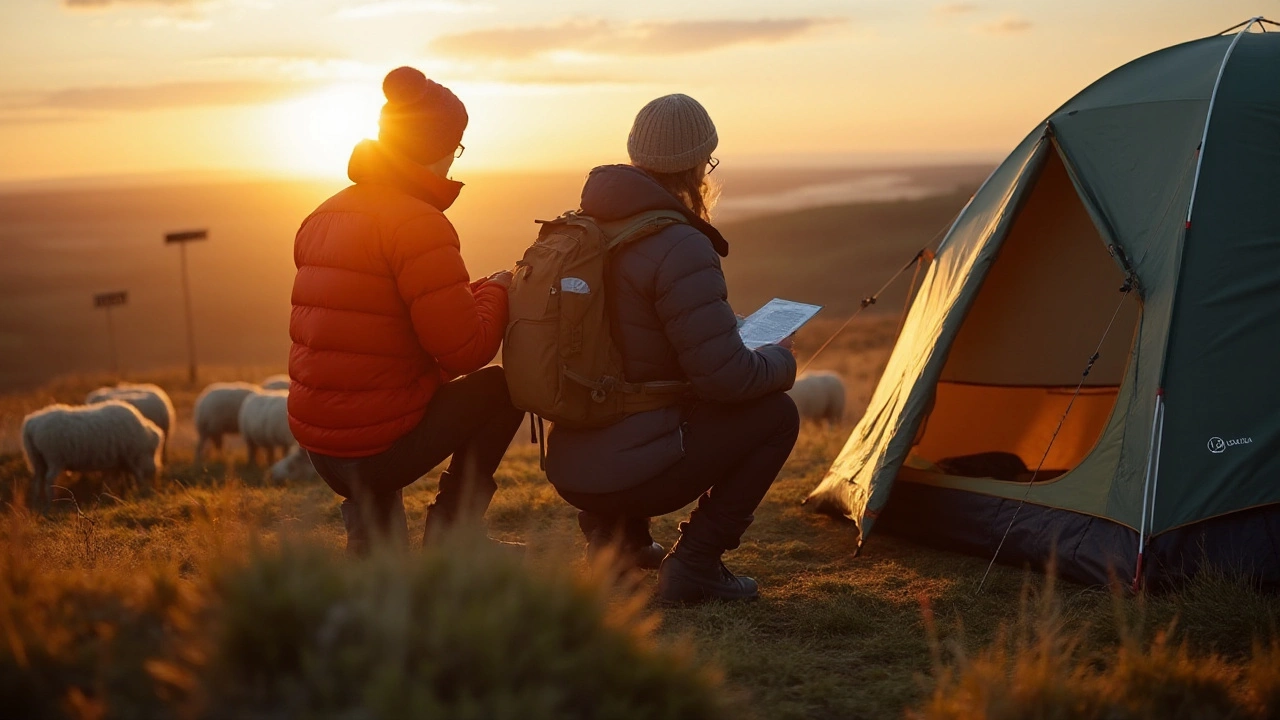Embarking on a wild camping adventure in the UK can be an exhilarating experience, offering a chance to connect with nature in its purest form. However, not every corner of this picturesque landscape is free for indiscriminate camping. Navigating the labyrinth of camping regulations is crucial for avoiding potential fines and penalties.
In recent years, laws surrounding rough sleeping and wild camping have evolved, raising the stakes for those who dare to camp unlawfully. Understanding these legalities not only saves one from unwanted fines but also ensures a respectful interaction with the environment and local communities.
This guide aims to illuminate the intricacies of these laws, exploring both the potential pitfalls and the beauty of responsible wild camping. Read on to equip yourself with the knowledge needed to enjoy a guilt-free camping experience in the UK's great outdoors.
- Understanding Rough Sleeping and Wild Camping
- Legal Framework and Recent Changes
- Fines and Penalties
- Impacts on Local Communities
- Tips for Responsible Wild Camping
- Alternative Camping Options
Understanding Rough Sleeping and Wild Camping
When adventurers yearn to immerse themselves in the raw beauty of the UK’s landscapes, the concept of wild camping often comes to mind. But what exactly differentiates it from the notion of rough sleeping? Though intertwined by the act of inhabiting outdoor spaces overnight without formal accommodation, their motivations and legal implications diverge significantly.
Wild camping is a choice, often pursued by hiking enthusiasts looking to find tranquility amidst the wilderness, from the rugged Highlands of Scotland to the serene expanses of the Lake District. It’s about venturing beyond designated campsites, often carrying minimalistic gear, to sleep under the starry sky. Yet, it’s not a free-for-all; many regions, especially in England and Wales, require permission from landowners as much of the land is privately owned.
Rough sleeping, on the other hand, is typically associated with homelessness—a dire situation rather than a chosen getaway. While camping for pleasure might be condoned or even encouraged in certain rural expanses, rough sleeping often highlights underlying social issues and bears additional scrutiny from authorities as it touches upon both social support systems and public space usage. As such, some regions enact measures that affect all forms of unauthorized sleeping outdoors.
"The challenge lies in discerning between a camper’s pursuit of nature and those necessitated by unfortunate circumstances." — Outdoor Access Guide
The legalities of wild camping in the UK bring about various nuances. In Scotland, for example, wild camping is largely legal thanks to the Right to Roam codified by the Land Reform (Scotland) Act 2003. However, even these rights come with caveats such as the prohibition of camping in certain areas like Loch Lomond, which has additional protections. The bylaws here were brought in due to environmental concerns over damage and litter from irresponsible campers. In contrast, England and Wales offer far fewer freedoms without prior consent.
Camping is, after all, an interaction not just with nature, but also with the local infrastructure and communities who share the land. Those who pursue wild camping are encouraged to follow the 'Leave No Trace' ethos, ensuring minimal impact on the environment. This involves practices such as packing out all trash, minimizing campfire impacts, and respecting wildlife, which further distances responsible wild camping from the implications of rough sleeping.
For those considering wild camping in the UK, understanding these differences is not merely academic; it’s practical and necessary. Whether one’s journey is infused by passion or necessity, a deep knowledge of legal frameworks and ethical guidelines helps safeguard the vibrant landscapes loved by many. It also ensures compliance with local regulations, helping to preserve both the land and the freedom to experience it in the future.
Legal Framework and Recent Changes
The legal landscape regarding wild camping in the UK has seen some important developments over the years. Traditionally, much of the UK countryside is privately owned, meaning that camping without permission could land one in legal trouble. This is particularly true in England and Wales where the rights of landowners have historically been quite robust. Consequently, camping without the expressed consent of the landowner has often been deemed illegal.
In response to growing outdoor tourism and environmental considerations, several areas, especially those with heavy foot traffic, have been re-examining their stances on camping. For instance, Scotland, under the Land Reform (Scotland) Act 2003, has distinctively embraced more liberal policies, allowing wild camping almost anywhere, provided campers follow the Scottish Outdoor Access Code. This development has made Scotland a particularly attractive destination for campers eager to explore the great outdoors.
More recently, the Coronavirus pandemic triggered a unique surge in domestic tourism, causing various parks and councils to adjust policies temporarily. Notably, areas of Dartmoor National Park imposed restrictions to address overpopulation concerns. Meanwhile, authorities in the Lake District have been increasingly active in clamping down on those who camp irresponsibly or leave behind litter. These shifts underscore a growing awareness of sustainable tourism.
"Respecting private land is crucial. Wild camping involves more than just pitching a tent – it’s about fitting into the landscape with no trace," recommends a representative from the National Parks Authority.
In England, the pressure on the government to legalize more spots for wild camping has led to petitions and proposals suggesting controlled and responsible camping areas. This push is supported by findings that show how well-managed camping can benefit local economies without harming natural beauty or public ameni...ies. While laws are firmly in place, ongoing discussions continue about how best to harmonize outdoor leisure activities with the need to protect the countryside from undue damage. The dynamic nature of these legal frameworks speaks to the ongoing evolution of outdoor recreation in the UK.

Fines and Penalties
When it comes to wild camping UK, understanding the potential fines and penalties is pivotal for anyone looking to explore the great outdoors without breaching the law. Although wild camping is often romanticized as a way to break free from civilization, it comes with its own set of rules and regulations. The fines for camping unlawfully vary across the UK due to differences in legal frameworks between countries such as England, Scotland, and Wales. In many local council areas, camping without permission can result in a fine ranging from £100 to £250. However, repeat offenders may face even steeper penalties, possibly leading to court appearances where fines can exceed £1,000. In some cases, your camping gear might also be confiscated by authorities.
Councillor Jane Smith from the Lake District National Park Authority once stated, "Wild camping has its place, and it's a fantastic way to experience nature. However, doing so legally ensures that our environments remain pristine for generations to come."
The legal landscape has grown stricter with increasing tourism pressures. In Scotland, where the Land Reform (Scotland) Act 2003 traditionally allowed more freedom to camp, changes were made to curb the overuse of fragile ecosystems. In certain protected areas, like Loch Lomond and The Trossachs National Park, campers must obtain a permit to pitch their tents legally. This legislative change was made not only to preserve the natural landscape but also to safeguard local communities who were grappling with the negative impacts of unsupervised camping, such as littering and noise pollution.
For those caught in breach of these laws, the first interaction usually involves a warning or advice from the local rangers. Yet, if someone repeatedly violates the camping guidelines, the consequences escalate. Authorities tend to issue fines to act as a deterrent and to cover the enforcement costs incurred by the park or the local authority. In some regions, rough sleepers, who might be homeless individuals using tents for basic shelter, are treated with more leniency due to their socio-economic circumstances. Instead of fines, social services often step in to provide help and alternatives.
Interestingly, adherence to these laws not only helps protect the countryside but also fosters a more respectful engagement with local communities. Residents in tourist spots often report issues with privacy and access due to unlawful campers occupying private lands. Being respectful and following rules can have a significant positive impact and encourage more areas to open up to wild camping. For those who want to ensure they're on the right side of the law, it’s advisable to check online resources or directly contact local authorities before setting up camp. This approach not only helps avoid fines but also enriches the camping experience through meaningful, immersive, and lawful engagement with the surroundings.
Impacts on Local Communities
Wild camping in the UK is alluring for its promise of solitude and natural beauty, yet it's important to recognize the potential effects on local communities. The allure of the wilderness often draws campers to remote areas, places cherished by locals for their undisturbed nature. However, the influx of campers, when not managed properly, can strain these communities. Littering is an unfortunate byproduct, as visitors sometimes leave behind trash and debris, marring the landscape and wildlife habitats. Clean-up efforts often fall on the local councils or volunteer groups, who dedicate countless hours to preserving the beauty of their surroundings.
The sound and presence of visitors frequently disrupt the tranquility local residents appreciate, potentially leading to a clash of interests. Noise and light pollution are less-obvious consequences of increased camping activity, but they can profoundly affect both human and wildlife populations. For instance, nocturnal animals might alter their behavior due to artificial lights or noise, impacting their natural cycles and, in the long term, the ecosystem balance.
Beyond environmental concerns, there's an economic aspect. While some wilderness areas thrive on tourism, unsanctioned camping can bypass established accommodations, like eco-friendly lodges or campsites, which depend on visitors. This can inadvertently affect local economies and diminish opportunities for revenue in areas that rely on controlled tourism for sustenance. Ascerbic feelings between campers and locals can arise, tarnishing the welcoming spirit of these communities.
A study by the National Parks and Wildlife Trust showed that collaborative efforts between locals and visitors bring the best results. By working together to respect camping guidelines, protect natural resources, and support local businesses, the community benefits more holistically. According to Simon Lee, a rural community activist, "The relationship between visitors and locals is like a tightrope walk, where balance ensures mutual respect and benefit."
Encouraging responsible camping practices is vital for harmonious interactions. Source reductions, such as using eco-friendly camping gear, respecting fire safety rules, and adhering to designated camping spots, are crucial actions campers can adopt. Simple but impactful, these measures ensure the sustainability of wild camping as an activity while fostering a positive relationship with the communities they visit.

Tips for Responsible Wild Camping
When it comes to wild camping in the UK, being eco-conscious and mindful of rules is the golden rule. One of the key principles is to practice the Leave No Trace ethos. This means wherever you set up your tent, you should leave the site pristine. This involves not just picking up every piece of trash, but also considering the impact of your presence on wildlife and vegetation. You've got to think about every step, like using biodegradable soaps and keeping campfires minimal or non-existent. If a fire is necessary, make sure to use a camping stove, as open flames can easily get out of control and leave scars on the beautiful landscape.
Understanding the specific rules for each area is a must before you pitch your tent. The UK is a tapestry of private and public lands, so knowing the distinction is important. In Scotland, for example, the rules are pretty relaxed due to the Right to Roam Act, but even there, you're expected to adhere to guidelines laid out by organizations like the Scottish Outdoor Access Code. In contrast, England and Wales have stricter regulations, and permission is often needed from landowners. This might seem like a lot to handle, but the effort ensures you're not part of the problem, but rather a steward of the environment.
Tuning into local advice can make your adventure both responsible and enriched with local knowledge. Speak to park rangers or consult local online forums to gather tips on the best practices for camping in specific areas. This is where community becomes paramount; joining camping groups not only helps you learn but can also assist in emergency situations. Sharing insights with others in forums or groups can amplify your camping experience and may introduce you to hidden gems. Often, rangers or experienced campers will suggest designated spots that, while perhaps slightly off the beaten path, offer stunning views and a chance to see undisturbed nature at its best.
"The best practice for wild camping is always to respect the land as if it's your own backyard." - The Wild Camping Guide
Creating an emergency plan isn't just being cautious, it’s being wise. Carrying a well-stocked first aid kit and enough supplies ensures safety in the face of the unexpected. Technology can be a lifesaver here; having a GPS device or a map and compass to navigate could be crucial if the digital gadgets fail. Plan your water sources meticulously. Some areas allow you to drink safely from streams, but it's always safer to carry purification tablets or portable filters. And let someone know your itinerary; that way, if something goes sideways, help can reach you faster. This kind of conscientious planning creates a secure and enjoyable trip for everyone involved.
Finally, consider your social responsibility by reflecting on the human impact of camping in the wild. This involves contemplating not only the ecological footprint but how your presence might affect the local communities, especially in more remote regions. The economic and social dynamics can be delicate, and your respect is shown by engaging positively with inhabitants, respectful of customs and traditions. Making use of local services supports these communities and often enriches the adventure with unique, authentic experiences.
Alternative Camping Options
For those who embrace the thrill of wild camping UK while yearning for a degree of legality and comfort, exploring alternative camping options can be both rewarding and enlightening. The challenge of finding a spot that marries freedom with legality may seem daunting at first, but with a bit of research and planning, you can find remarkable alternatives to traditional wild camping. Recognizing areas where the countryside invites campers without legal consequences can afford you a peace of mind rarely found in unauthorized camping adventures.
One popular alternative includes designated campsites nestled within the boundaries of picturesque landscapes. These sites often offer the same breathtaking views as a wild camping spot but come equipped with basic amenities like fresh water, toilets, and sometimes shower facilities. Opting for such designated areas not only aligns with the legal expectations but also supports the maintenance and preservation of the natural landscape. This practice benefits both individual campers and nature, enabling a symbiotic relationship where each camping trip leaves no detrimental trace on the environment.
A more adventurous alternative involves acquiring a wild camping permit in areas where it is feasible. While the idea of permits may seem counterintuitive to the untamed spirit of wild camping, they are prevalent in places like Scotland, where the laws are generally more lenient compared to the rest of the UK. UK rough sleeping fines can be avoided by securing these permits, which often come with guidelines ensuring minimal impact on the surroundings. Make sure to check the specifics of the area you're interested in, as these guidelines can vary, but they ultimately focus on preserving the pristine quality of these areas for future campers.
“Camping should be about getting closer to nature, not breaking the law, and the right planning can help campers achieve that,” notes Jonathan Knight, a well-regarded outdoor travel expert.
An increasingly popular trend is the utilization of private land through platforms that connect landowners and campers. This form of 'pop-up' camping can provide a unique experience, offering the thrill of new locales combined with the security of landowner consent. By using platforms such as Hipcamp or Pitchup, campers can enjoy legally sanctioned stays, often with the added benefit of local expertise and tips from the landowners themselves. This option not only supports the rural economy but also opens up a world of potential camping spots that may not traditionally be accessed by campers. It highlights a more personal connection with the places where you pitch your tent.
Additionally, consider exploring the lower impact options such as cycle camping or backpacking tours, which blend the adventure of camping with the excitement of an active exploration. While these options might require more gear and planning, they can take you to lesser-known destinations that offer stunning landscapes minus the crowds.
To better help you decide, here's a quick comparison of these alternatives and the aspects to consider when planning your trip:
| Option | Legal Concerns | Amenities | Environmental Impact |
|---|---|---|---|
| Designated Campsites | Permissible | Available | Low, with adherence to rules |
| Wild Camping Permits | Legal with permit | Minimal | Low, if guidelines followed |
| Private Land (Pop-up Camping) | Legal with permission | Variable | Varies, based on landowner |
| Cycle/Backpacking Tours | Varies by location | Minimal | Low, encourages small group travel |
Engaging in these camping laws UK compliant options not only protects you from unwanted penalties but also cultivates a profound respect for the spaces we share. These alternatives ensure that you're doing your part to preserve the beauty of the landscape while indulging in the immense satisfaction and tranquility that camping brings.
